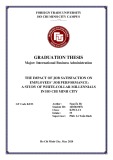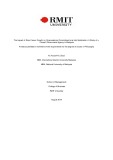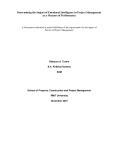
TNU Journal of Science and Technology
230(03): 11 - 21
http://jst.tnu.edu.vn 11 Email: jst@tnu.edu.vn
ORGANIZATIONAL JUSTICE AND ORGANIZATIONAL CITIZENSHIP
BEHAVIORS: MEDIATING ROLE OF JOB SATISFACTION
Vu Thi Huong Giang*, Nguyen Thi Anh Tho, Pham Thi My Ha
Foreign Trade University
ARTICLE INFO
ABSTRACT
Received:
26/9/2024
This study aims to examine the effect of organizational justice on the
organizational citizenship behaviors of employees in information
technology enterprises, with a specific focus on the mediating role of job
satisfaction. Data was collected from 300 voluntary respondents working
in information technology enterprises in Vietnam, using online structured
questionnaires. The sample data was analyzed using partial least squares
structural equation modeling (PLS-SEM) with the assistance of Smart
PLS 4 to evaluate the measurement and structural model, as well as to test
the proposed hypothesis. The research findings indicated a positive
relationship between specific dimensions of organizational justice, such
as distributive justice, procedural justice, interactional justice, and
organizational citizenship behaviors. Additionally, the study highlighted
the mediating role of job satisfaction in the positive effects of distributive
justice, procedural justice, and interactional justice on organizational
citizenship behaviors. The implications of this study suggest that to
promote improved attitudes and behaviors at work, especially
organizational citizenship behaviors, business managers should consider
enhancing job satisfaction within their companies by fostering procedural,
distributive, and interactional justice.
Revised:
10/02/2025
Published:
11/02/2025
KEYWORDS
Organizational justice
Job satisfaction
Organizational citizenship
behavior
Mediation model
Information Technology
industry
CÔNG BẰNG TỔ CHỨC VÀ HÀNH VI CÔNG DÂN TỔ CHỨC:
VAI TRÒ TRUNG GIAN CỦA HÀI LÒNG CÔNG VIỆC
Vũ Thị Hương Giang*, Nguyễn Thị Ánh Thơ, Phạm Thị Mỹ Hà
Trường Đại học Ngoại thương
THÔNG TIN BÀI BÁO
TÓM TẮT
Ngày nhận bài:
26/9/2024
Nghiên cứu này nhằm mục đích kiểm định ảnh hưởng của công bằng tổ
chức đối với hành vi công dân tổ chức của nhân viên trong các doanh nghiệp
công nghệ thông tin, tập trung cụ thể vào vai trò trung gian của sự hài lòng
trong công việc của nhân viên. Nghiên cứu đã sử dụng bảng câu hỏi có cấu
trúc trực tuyến để thu thập dữ liệu từ 300 đáp viên tự nguyện tham gia, hiện
đang làm tại các doanh nghiệp công nghệ thông tin tại Việt Nam. Dữ liệu
nghiên cứu được phân tích bằng mô hình cấu trúc bình phương nhỏ nhất
từng phần (PLS-SEM) với sự hỗ trợ của phần mềm SmartPLS 4 để đánh giá
mô hình đo lường và mô hình cấu trúc, cũng như kiểm định các giả thuyết
nghiên cứu. Kết quả nghiên cứu chỉ ra mối quan hệ tích cực giữa các khía
cạnh cụ thể của công bằng tổ chức như công bằng phân phối, công bằng thủ
tục, công bằng tương tác đối với hành vi công dân của tổ chức. Bên cạnh đó,
nghiên cứu đã nhấn mạnh vai trò trung gian của hài lòng công việc trong
mối quan hệ tích cực của công bằng phân phối, công bằng thủ tục và công
bằng tương tác đối với hành vi công dân tổ chức. Ý nghĩa của nghiên cứu
này cho thấy rằng để cải thiện thái độ và hành vi tại nơi làm việc, đặc biệt là
hành vi công dân tổ chức, các nhà quản lý doanh nghiệp nên xem xét nâng
cao sự hài lòng trong công việc của nhân viên bằng cách thúc đẩy sự công
bằng về thủ tục, phân phối và tương tác trong tổ chức.
Ngày hoàn thiện:
10/02/2025
Ngày đăng:
11/02/2025
TỪ KHÓA
Công bằng tổ chức
Hài lòng công việc
Hành vi công dân tổ chức
Mô hình trung gian
Ngành công nghệ thông tin
DOI: https://doi.org/10.34238/tnu-jst.11188
* Corresponding author. Email: giangvth@ftu.edu.vn







































